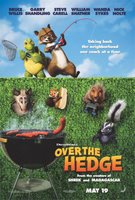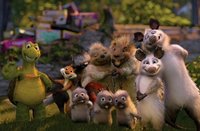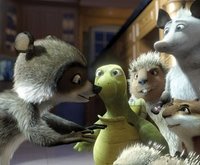 Sometimes inspiration comes from the strangest of places. Just a few weeks ago I made the decision to join meet my family at the movies. It was a decision, not a whim, because I was in the thick of a seriously overactive schedule and I had to decide that spending 90 minutes of my time at a "kids movie" like Over The Hedge was not unimportant. The 90 minutes would have been important simply because I shared it with my wife and children, but I was additionally blessed by a good movie with an inspiring message.
Sometimes inspiration comes from the strangest of places. Just a few weeks ago I made the decision to join meet my family at the movies. It was a decision, not a whim, because I was in the thick of a seriously overactive schedule and I had to decide that spending 90 minutes of my time at a "kids movie" like Over The Hedge was not unimportant. The 90 minutes would have been important simply because I shared it with my wife and children, but I was additionally blessed by a good movie with an inspiring message.Over the Hedge is a parable of community. R. J. the racoon is a greedy loner who makes his way in the world by scavenging the snack foods that humans enjoy to excess. Vincent the bear also likes the goodies in a "pick-a-nick" basket, but he's no Yogi Bear. Vincent is more like Don Vito Corleone, and when R. J.'s heist of Vincent's stash goes wrong Vincent demands repayment or else R. J. becomes tasty treat himself.
 R. J.'s pressure to repay the impossible debt sets the story. What follows is a multi-layered homily on community. On one layer, R. J. finds the source of easy comestibles in the El Rancho Camelot suburbs, which are just over the hedge from the forest. El Rancho Camelot and Gladys Sharp, the homeowner's association president, serve as a thought-provoking commentary on American consumerism. Do we really build our houses that big? Do we really consume that much junk? The movie doesn't preach, but one cannot fail to get the point as our over-indulgent lifestyles are not only seen from the perspective of the wee creatures, but also reflected in their anthropomorphic antics.
R. J.'s pressure to repay the impossible debt sets the story. What follows is a multi-layered homily on community. On one layer, R. J. finds the source of easy comestibles in the El Rancho Camelot suburbs, which are just over the hedge from the forest. El Rancho Camelot and Gladys Sharp, the homeowner's association president, serve as a thought-provoking commentary on American consumerism. Do we really build our houses that big? Do we really consume that much junk? The movie doesn't preach, but one cannot fail to get the point as our over-indulgent lifestyles are not only seen from the perspective of the wee creatures, but also reflected in their anthropomorphic antics. And that's yet another layer of this film. R. J. meets up with a group of friendly forest dwellers made up of a turtle, a skunk, a squirrel, two opossums, and a porcupine family. The odd assortment of beasts live together in utopian harmony as a commune community. They gather just what is needed until R. J. changes that by introducing the forest family to the possibilities of treasures over the hedge. Of course we know that R. J. is exploiting the others to gather what he needs to pay off Vincent. As would be expected, R. J. falls in love with the funny animals and finds community.
And that's yet another layer of this film. R. J. meets up with a group of friendly forest dwellers made up of a turtle, a skunk, a squirrel, two opossums, and a porcupine family. The odd assortment of beasts live together in utopian harmony as a commune community. They gather just what is needed until R. J. changes that by introducing the forest family to the possibilities of treasures over the hedge. Of course we know that R. J. is exploiting the others to gather what he needs to pay off Vincent. As would be expected, R. J. falls in love with the funny animals and finds community. Which peels off yet another layer of this film: R. J. is revealed as a fraud but he repents by rescuing the others from the evil Verminator. In turn, the forest community rescues R. J. from the clutches of Vincent. How does a community reconcile with a betrayer? How do they restore R. J. to their community when they know he has lied to them? I realize that the movie simplifies such issues (hey, they only have 90 minutes) but I respect that the movie didn't make the reconciliation too simple. In a style that would make old Aesop proud, the animals demonstrate how community depends on forgiveness, reconciliation, and redemption. The challenge of both the offended community to forgive and the offender to repent are told beautifully.
Which peels off yet another layer of this film: R. J. is revealed as a fraud but he repents by rescuing the others from the evil Verminator. In turn, the forest community rescues R. J. from the clutches of Vincent. How does a community reconcile with a betrayer? How do they restore R. J. to their community when they know he has lied to them? I realize that the movie simplifies such issues (hey, they only have 90 minutes) but I respect that the movie didn't make the reconciliation too simple. In a style that would make old Aesop proud, the animals demonstrate how community depends on forgiveness, reconciliation, and redemption. The challenge of both the offended community to forgive and the offender to repent are told beautifully.I consider this movie to be Dreamworks' best effort to date. I applaud them for sharing their parable. Those 90 minutes were well spent and I stepped out of the theatre with an even greater appreciation and love for my family and my community of faith.
No comments:
Post a Comment